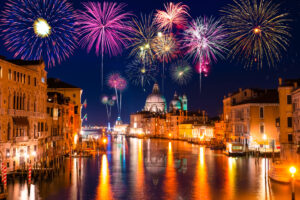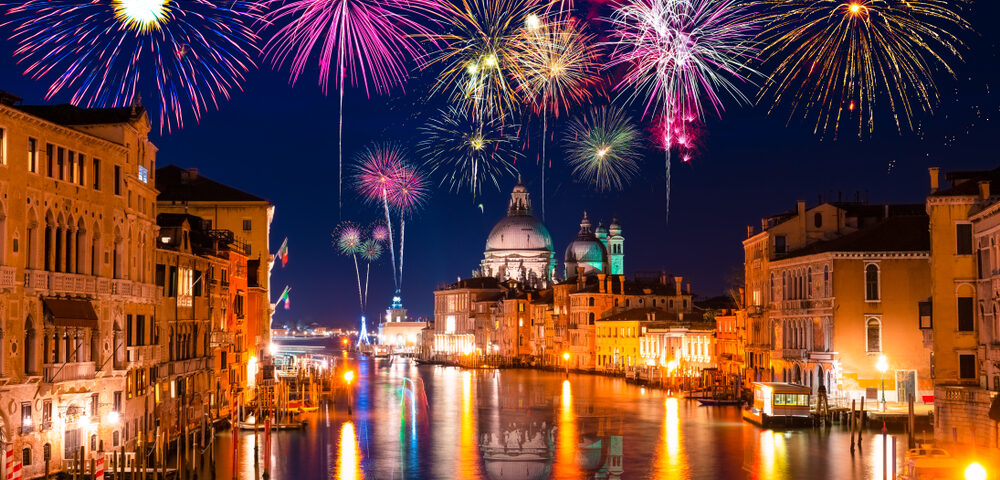
I am, at the moment, seated at a café, on a side street, just behind the Church of Santa Maria della Salute in Venice. But putting pen to paper is, for some very good reasons, a very daunting task.
It is trip number eleven to this city and I still don’t have a handle on it. Why is it that we feel we have finally seen Rome and experienced Florence? But Venice, ahhh, that’s another story. It is a different city in the rain, a quaint Italian metropolis in the winter, a hot, crowded kaleidoscope of moving humanity framed by water in the summer. But the waters in Venice lap the shoreline less playfully then it does on other Italian shorelines. Here the water is a reminder of an epic battle with the winner predetermined. The water will win.
I flew over through London connecting on a BA flight. This was during the strike action and I was mildly concerned about my Heathrow connection. But BA seemed very concerned about my short hop in coach over to Venice and sent me four e-mail updates to say they were looking forward to welcoming me aboard the A320 and reminding me, much like a concerned parent that my flight would operate.
True to their word, no problems. The only way one could tell that there had been a strike action was the Departure Board. We took off on time and the pilot came on the PA system and mentioned that he was an actual experienced pilot and not a member of BA management. The in-flight entertainment had begun.
Surprisingly a “light meal” was being served by the erstwhile young flight attendant coming down the aisle. I asked him what he was serving, which elicited the explanation “well sir, let’s just say it is a ham and cheese sandwich but without the cheese and with very little ham.”
In retrospect, an accurate culinary appraisal.
Our driver was nowhere to be found as I passed through customs and entered the arrival hall at Marco Polo.
But I did not panic. No Italian driver is going to spend an hour standing behind a rope for an undetermined amount of time doing absolutely nothing. I found the nearest airport bar and found him standing at the counter drinking a cappuccino, his cup resting on the portion of the sign that read “Turen”.
We drove for a few minutes to Piazza Roma, the point where cars from the airport park illegally, as the driver desperately tries to find the water taxi captain, and get passengers and luggage to the waiting boat. I enjoyed the chaos and screaming that accompanied this “transfer” but I would have enjoyed it more had I not calculated that the ride had cost me 15 Euros per minute.
Seated in the boat en route to my hotel, the senses quicken. This is one of the most pleasurable rides on the planet as you get a sense of the lagoon, the water lapping at the shores, and the architectural consistency of this entire movie set of a city.
I sit in the back of the sleek craft because I want to feel water splashing my face on this sunny summer morning. It helps with the jet lag.
Venice, will, I know, seem crowded. In the early nineties, the border police set up tables at Santa Lucia, the main train station, and denied access to the city to anyone who could not prove that they had a confirmed hotel reservation. What would I find this time in prime season?
We cruised down the Grand Canal and I asked my driver to slow it down so I could, once again, savor this experience.
I was deposited at the dock directly in front of The Londra Palace, one of my favorite Venice properties.
Formed by the merging of two former palaces, with more than 140 years of experience servicing guests, the Londra Palace has only 53 rooms. But it more than a hundred windows facing the Lagoon. I occupy a wood-beamed room on the upper floor with horizontal windows cut high into the walls looking out.
There is a delightful rooftop terrace. In the morning, you can hear church bells from the terrace playing a concert in stereo as the bells ring at the same time from several sections of the city.
At night, in the quiet, I could imagine a younger Tchaikovsky, who stayed in room 106 in 1877 while working on his Fourth Symphony. The light never goes off in room 106.
I slept well at this wonderful hotel. And I went to bed thinking I was hearing a piano playing in a room a few floors below.
Last night, I spend hours walking the city. In Venice one does not walk with purpose to find things. One walks to get lost, to get beyond the tourist circle and to see the neighborhoods. But in the area around St. Mark’s Square, I found some signs of the new travel economy everywhere.
In the narrow alleys behind the Basillica San Marco, waiters stood in front of highly-rated restaurants urging customers to enter. But trattoria’s were humming and there were lots of Russian and German voices.
In San Marco , one of the two large outdoor café’s was closed and the area had been turned into a construction site. At the famed Café Florian across the square, a small orchestra and the violinists still play, but most of the tables are empty. Instead, hundreds of tourists stand for a while taking in the scene, wanting to share in the experience, but unwilling to pay inflated prices for a drink or two.
I noted that again as I wandered the Riva degli Schiavoni. Violinists play but no one pays. The masses stand staring waiting for some rich tourists to actually sit and pay for their free show.
There are more tee-shirt shops and more stands selling tourist flotsam. Small groups led by bored guides carrying yellow and red umbrellas pass by.
I look out to the sea. The sun is just disappearing on the horizon, framing the blue canvas tarps and the beautiful gondolas they protect. Sea gulls perform dances above the harbor.
I pass over a bridge and see, to my left, a small line of gondolas returning with their human cargo. In the minutes before disembarkation two of the gondolas break out in song. It is tip time.
Moments later, I poke into the Hotel Danieli, the five-star matron on the Lagoon. Surely, I will find evidence of the luxury traveler within this wood-paneled lobby.
The single desk clerk does not look up from his magazine as I enter. I wander into the lobby area. It is empty. And this is the cocktail hour.
Now, I am determined to return to Venice soon. I cannot accept that Venice is falling victim to economic realities.
The city has never had the best hotels, the Cipriani being the exception. Italians would never say that the food rivals that found in Emilio-Romagna or Umbria, although Da Ivo, Do Forni, and Corta Sconta are certainly exceptions.
But walking Venice, getting away from the tourists, crossing bridge after bridge on foot, is still as rewarding as it always was. There is no place on earth quite like it.
In the prologue to his bestseller, “The City of Falling Angels”, author John Berendt encounters a Venetian Count who explains the city in terms of its rhythm.
“Venice is like breathing. High water, high pressure, tense. Low water, low pressure relaxed. Venetians are not at all attuned to the rhythm of the wheel. That is for other places.”
Venice must always be walked. It is an off-season destination if there ever was one and I would recommend it as a viable mid-winter destination, free of tourists, and filled only with relaxed locals. I prefer it when it rains – Venice is best seen from under an umbrella.
Headed back one night toward the Londra Palace, I notice two handsome Carabinieri on patrol, pausing for a rest in the middle of a small bridge. They remove their hats, posing with the sea in the background. And slowly, people stop to talk to them. Some of the husbands take pictures of their wives with the policemen. There is laughter; the lights on the edges of the lagoon have replaced the fading sunlight.
I hear whispered “buona nottes”.

